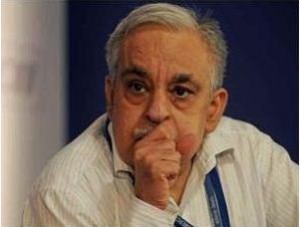Trai chairman Rahul Khullar disputes govt’s claim of a rise of 1.3 p/min in call rates after spectrum sale.
The Telecom Regulatory Authority of India expects the aggressive bidding witnessed in the recently concluded spectrum sale to drive the costs of telcos by 12-15% as it disputes the government’s estimates that call rates will rise by just 1.3 paise a minute.
“Cost increases will have to be passed through to the consumers in some form. The cost impact varies from 6 paise to 7 paise a minute,” Trai chief Rahul Khullar told ET in his first interview after the spectrum auctions ended on March 25. “I think it (the increase) will go through voice tariffs at present.” Currently, the average realisation for voice and data services is about 48 paise per minute.
Khullar’s comments come almost two weeks after a bitterly fought auction of 2G and 3G airwaves ended, netting the government a record Rs 1.1 lakh crore. The starting prices for the 2G bands of 800 Mhz and 900 Mhz, set by the government, were 17% and 23% higher than what Trai had recommended.
A brutal fight for the 900 Mhz and 800 Mhz bands saw their respective bid levels surge 93% and 77% over the base prices, driving up the booty for the Centre. Telecom minister Ravi Shankar Prasad had said call rates would just rise by 1.3 paise per minute after the auctions, but Khullar said the impact would be higher as the government had not taken the cost of capital deployed by the telcos while making its calculations.
He agreed with the government that the tariff increase wouldn’t hurt the wallets of consumers as it would be spread over some years. Trai chairman, who retires next month, criticised the government for creating a situation where operators were forced to bid aggressively just to survive and for not releasing adequate spectrum, which, along with the paucity of towers, was at the heart of the current poor quality of voice and data services.
He said the steep bidding levels will hurt operating margins this financial year, which started April 1. Moreover, the high costs will crimp investments on rolling out new networks or even on upgrading existing networks, thus hurting call and data services. “The auctions will exert pressure on the EBITDA margins of the industry in 2015-16. However, the bigger impact will be over 2016-17, when the operators have to generate funds to roll out services and deploy newer technologies,” Khullar said.
READ ALSO: Telecom tariffs likely to go up, industry says
Sector’s debt to hit Rs 3.5 lakh cr
The GSM industry lobby body has estimated the sector’s debt will rise to over.`3,50,000 crore after the auctions. “With such high exposure from the banks…where will they (telcos) get the funds from?
The QoS (quality of service) is already pretty bad. Either the government releases more spectrum or operators put up more towers. None of the two is possible at this time, especially towers in urban areas. How do you think the QoS will improve?” Khullar said. He added that the government had opted for revenue maximisation while designing the just-ended sale.
“That is exactly what we had predicted — that there will be a battle to the death for this (900 Mhz) spectrum,” Khullar said. He was referring to the situation faced by players such as Bharti Airtel, Idea Cellular, Vodafone India and Reliance Communications, which had to bid to retain airwaves in the 900 Mhz band in some circles to continue operations since their permits were expiring over 2015 and 2016. The Trai chairman urged the government to come up with spectrum trading and sharing guidelines, which would bring in much-needed consolidation and ease pressure on existing airwaves.
“I think M&A part is still unclear. Once the government finalises the trading and sharing guidelines, operators will just strip assets and monetise them,” he said. He said the government needed to take a big-picture view of the current situation and give out a road map for spectrum availability and auction timeline well in advance.
“The government must announce very clearly what amount of spectrum and in which band it will reclaim from which government agencies. It must make the timeline very clear. It must also make clear as to when it plans to auction those airwaves,” Khullar said.







